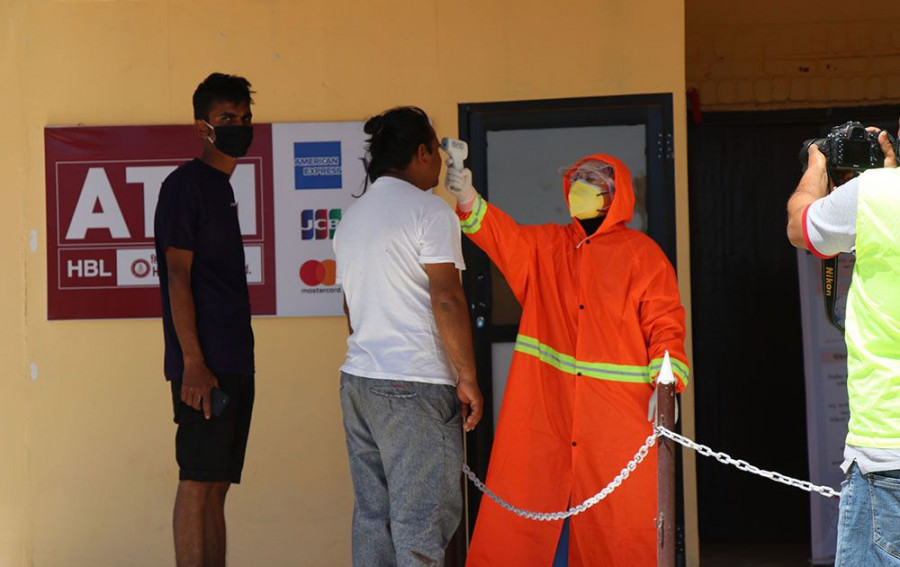Health
Fear of infection still keeping patients away from hospitals across the country
Doctors worry patients avoiding hospital visits for fear of contracting Covid-19 could lead to far worse consequences in cases of heart and stomach problems and cancers.
Samiksha Baral
Radha Bhattarai has been unwell for several months now. But she and her family in Sindhuli would rather want her to stay away from hospitals.
In January, Bhattarai, 56, had a tumor in her kidney removed at Patan Hospital, Lalitpur. Doctors in Sindhuli, some 134 kilometres east of Kathmandu which has one government hospital, had referred her to a Kathmandu hospital for the urgent operation.
The two-hour-long operation went well. But worries of the Bhattarai family remained.
Bhattarai had been called for a routine check-up in July when the country was on a lockdown. With the fear of Covid-19 and travel restrictions, neither Bhattarai nor her family was ready to take the risk. The follow-up consultation never happened.
To make things worse for the Bhattarai family, while she writhed in pain her medicines ran out in July.
“On days when there is pain, I feel I simply cannot bear it anymore,” Bhattarai told the Post from Sindhuli, over the phone, with her voice breaking. “My family also thought of consulting a health worker from the local health post.
But Radha’s family thought it was too big a risk to take her to hospital. They want to wait for the situation to normalise.
“Now there is no lockdown and people can travel from one place to another, but Covid-19 is still there,” she said. “I would rather wait than get infected on the way or in the hospital.”
As the Covid-19 pandemic continues to rage on, the general public with health complications, some even with life-threatening diseases, are reluctant to visit the hospitals, fearing the virus infection.
For several months, when the nation was under a lockdown beginning March 24, followed by prohibitory orders imposed in several districts, many patients and their families could not visit hospitals because of transportation problems.
Now, when there is no lockdown and prohibitory orders in place, families the Post reached out to were still hesitant to make a visit to the hospitals in their districts or in the Kathmandu valley where they were referred.
Hem Prasad Bhattarai, Radha’s husband, said they are petrified of going to the hospitals, fearing Radha and family members accompanying her would catch the coronavirus.
“I have seen my wife racked with pain. Who would want a family member to suffer with pain?” said Bhattarai. “It’s not that we do not care about her pain but we are just waiting for the right time to visit the hospital.”
The agony is not for the Bhattarai family alone.
Yasoda Dahal needs regular hospital visits—sometimes twice or thrice in a month. Yasoda, 75, has been diagnosed with various issues with her health in the last few years. She visits Tribhuvan University Teaching Hospital from Naya Thimi, Bhaktapur for her regular check-up.
Since March, she has not made a single visit. With the Covid-19 concerns still around, especially for elders, her family has been postponing her treatment. Instead, they are relying on a local clinic and medication it prescribes.
“We are regularly visiting the clinic nearby and bringing medicines home but haven’t gone to the hospital yet,” Aashish Dahal, her grandson, said.
As coronavirus cases increased in the country, most hospitals rushed to shut down their outpatient department. Hospitals like Seti Zonal hospital in Dhangadi, which used to see an average of 600 patients every day before Covid-19, had only a few dozen visiting.
There were numerous reports of hospitals turning away patients, at times even in emergency cases, which led to several deaths in different parts of the country. Amidst the fear of the pandemic, even pregnant women stayed home and chose unsafe deliveries, which resulted in dozens of deaths of pregnant women in the last five months as they could not reach the hospitals.
Records at different hospitals show that patient visits have gone down drastically. Patan Hospital in Lalitpur used to serve around 1,800 to 2,000 outpatients every day, according to Dr Bishnu Prasad Sharma, the hospital director.
“The daily visit during the Covid-19 lockdown had come down to 150-200,” said
Dr Sharma, who also oversaw operations during the pandemic before retiring last month. “I don’t think people were reluctant to visit hospitals only because of the lockdown and transportation problem.”
Other hospitals in different parts of the country also witnessed a decline in patient numbers.College of Medical Sciences was one that saw a significant drop in patient visits.
According to Dr Pukar Ghimire, a general physician at the College of Medical Sciences,the health facility recorded around 90 percent drop since the Covid-19 began.
“Many hospitals have different buildings and separate groups of manpower for treating all kinds of patients. While Hospitals like Tribhuvan University Teaching Hospitals, BPKIHS have different buildings to treat the Covid-19 patients but this is not the case in other hospitals, which have very few buildings and patients have to share the same staircase and passage,”said Dr Ghimire. “This might be another reason patients are afraid to visit hospitals.”
Dr Narayan Parajuli of Meditech International Hospital, a private health care centre in Butwal, wonders about the condition of patients who have postponed their hospital visits.
“During pre-Covid days our hospital used to see 200-300 patients each day, but after lockdown, the number dropped off to 10-15 and we were even compelled to close the hospitals for a few weeks,” said Dr Parajuli.
The city of Butwal, the headquarters of Province 5, is the health service destination for people of Gulmi, Arghakhanchi, Dang, Nawalparasi and Rupandehi, among other adjoining districts.
Dr Parajuli’s hospital saw a drop of 80 percent in the emergency ward.
Hospitals, which once scrambled to treat hundreds of visiting patients every day, are still wearing deserted looks as patients coming for treatment have not improved much although there are relaxation in travel restrictions.
“We used to think that restrictions on public movement was the main factor behind fewer people visiting the hospital,” said Dr. Ghimire of College of Medical Sciences. “Even though vehicular movements have resumed, the numbers have not revived back like normal days.”
However, such a massive drop in hospital visits does not go all well with ailing patients.
Doctors fear that a person who needs emergency care choosing not to visit hospitals—or delaying their due visits, could lead to another crisis within the Covid-19 crisis. They assure that required precautions are taken to treat non Covid-19 patients.
“It might be because of fear of Covid-19 but it’s really bad to put your health at risk because of the fear of Covid-19,” said Dr Parajuli. “Even though we are wearing protective gear to stop the spread of the virus, patients were reluctant to visit the hospital. We send the patients to the fever clinic before admission and if there was a fever or any kind of symptoms we used to refer them to the zonal hospitals.”
In Sindhuli, Bhattarai’s family is planning to visit Kathmandu for a check-up soon.
But, the right time does not seem to have yet arrived for the Bhattarai family as Covid-19 cases are rising every passing day.
“Now we can travel to Kathmandu as there is no lockdown and vehicles have started operating too,” said Bhattarai. “But we are still scared.”
According to Dr Bhagwan Koirala, president of Nepal Medical Council, delay in the early care during a pandemic could lead to thousands of avoidable deaths.
“Getting proper care quickly can make a big difference in anyone’s life,” Koirala said. “For instance, early stage cancer, heart problems, kidney problems, severe stomach pains need immediate care otherwise it would lead to serious health consequences in future. Too many future deaths can be preventable if people seek the proper health care they need from the hospitals across the country.”




 20.78°C Kathmandu
20.78°C Kathmandu














